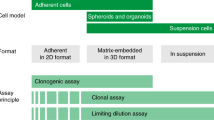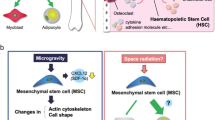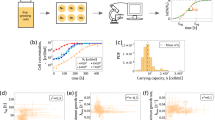Abstract
BECAUSE of the known effects of high gravity on normal growth, and of other associated effects which might influence a tumour-host relationship, 5-week-old, Swiss Webster mice bearing transplanted sarcoma 180 tumours were subjected to continuous centrifugation simulating high-intensity gravitational fields. Experiments with several living forms have demonstrated that a gravitational field influences growth mechanisms and their control1,2. Continuous exposure of mice to centrifugation can produce a retardation of normal growth. Initial exposure induces a decrement in food intake3 and in body mass followed by a gradual but usually incomplete recovery4. There are other effects such as changes in relative dimensions of the adrenal gland, spleen, and femur bone1,2,5. (It should be appreciated, however, that some of these changes might not be meaningful as relative organ sizes vary with stage of development6.) Both the spleen and the adrenal gland have been implicated in the tumour–host relationship7. Also a decreased caloric intake, characteristic of animals exposed to centrifugation, has been reported by many workers to retard the growth of transplanted tumours in experimental animals. This is reviewed by White8.
This is a preview of subscription content, access via your institution
Access options
Subscribe to this journal
Receive 51 print issues and online access
$199.00 per year
only $3.90 per issue
Buy this article
- Purchase on Springer Link
- Instant access to full article PDF
Prices may be subject to local taxes which are calculated during checkout
Similar content being viewed by others
References
Wunder, C. C., Lutherer, L. O., and Dodge, C. H., Aerospace Med., 34, 5 (1963).
Smith, A. H., and Kelly, C. F., Ann. N.Y. Acad. Sci., 110, 410 (1963).
Wunder, C. C., Proc. Soc. Iowa Acad., 68, 616 (1961).
Wunder, C. C., Womboldt, D., and Oberg, E. N., Nature, 195, 50 (1962).
Briney, S. R., and Wunder, C. C., Amer. J. Physiol., 202, 461 (1962).
Wunder, C. C., and Lutherer, L. O., Intern. Rev. Gen. Exp. Zoo. (under contract 1964).
Begg, R. W., Adv. Cancer Res., 5, 1 (1958).
White, F. R., Cancer Res., 21, 281 (1961).
Walters, G. R., Wunder, C. C., and Smith, L., J. App. Physiol., 15, 307 (1960).
Moressi, W. J., Herrin, W. F., and Wunder, C. C., Proc. Iowa Acad. Sci., 68, 603 (1961).
Goodall, McC., J. Clin. Invest., 41, 197 (1962).
Stiehm, E. R., J. App. Physiol., 17, 293 (1962).
Old, L. J., Clarke, D. A., Benacerraf, B., and Goldsmith, M., Ann. N.Y. Acad. Sci., 88, 264 (1960).
Malkiel, S., and Hargis, B. J., Cancer Res., 21, 1461 (1961).
Author information
Authors and Affiliations
Rights and permissions
About this article
Cite this article
LUTHERER, L., WUNDER, C., MORESSI, W. et al. Implanted Tumour Growth in Mice exposed to Continuous Centrifugation. Nature 201, 303–304 (1964). https://doi.org/10.1038/201303a0
Issue Date:
DOI: https://doi.org/10.1038/201303a0
Comments
By submitting a comment you agree to abide by our Terms and Community Guidelines. If you find something abusive or that does not comply with our terms or guidelines please flag it as inappropriate.



